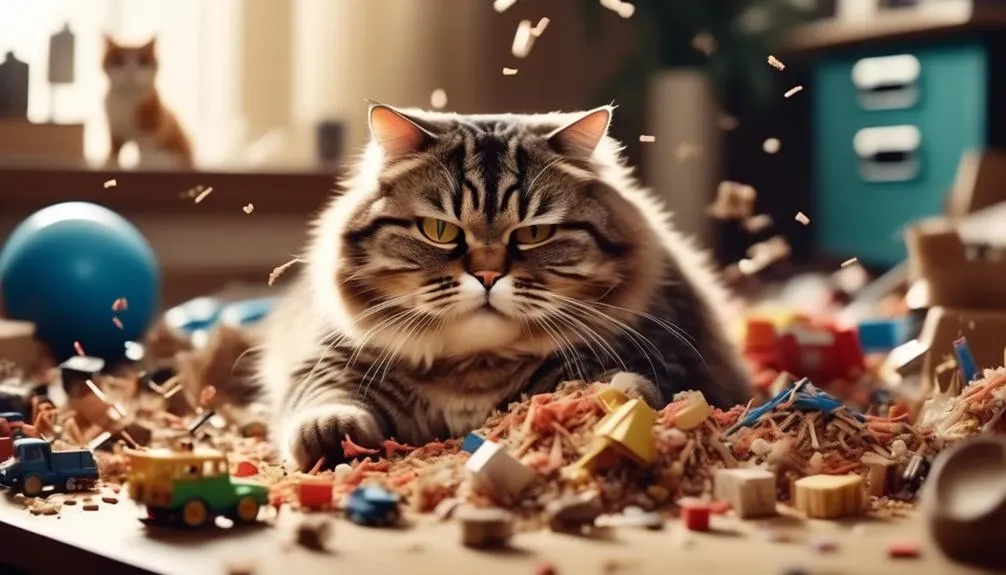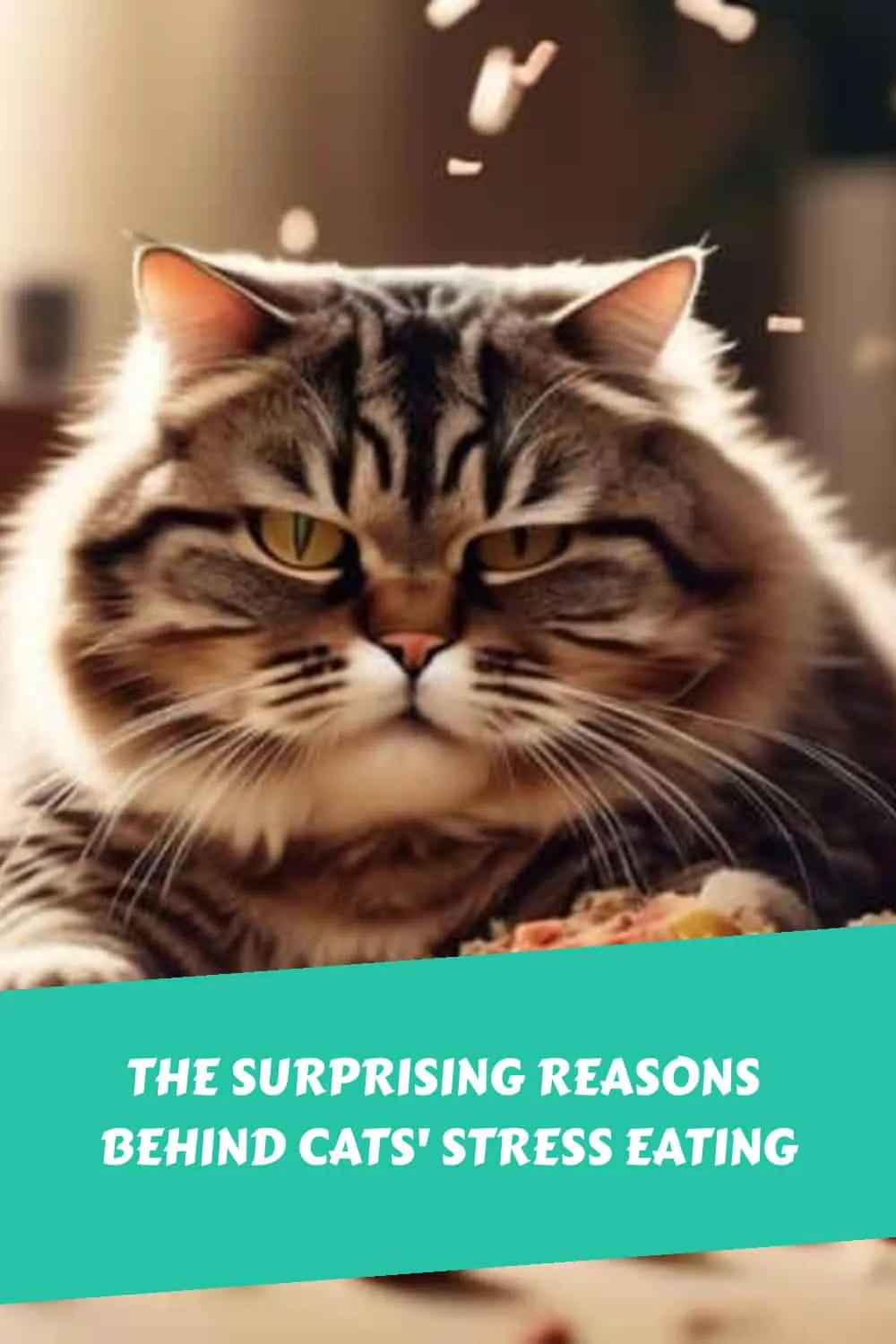The Best Fluffy Pancakes recipe you will fall in love with. Full of tips and tricks to help you make the best pancakes.

Stress eating in cats may seem like an unlikely behavior, given their independent and aloof nature. However, there are surprising factors that contribute to this phenomenon in our feline companions. Understanding the underlying causes of stress eating can provide valuable insights into our pets' emotions and help us better support their well-being.
From emotional triggers and environmental factors to the role of comfort food, exploring the complex relationship between stress and overeating in cats reveals a fascinating and often overlooked aspect of their behavior.
So, what are these surprising reasons behind cats' stress eating? Let's delve into this intriguing topic and uncover the hidden motivations behind our feline friends' eating habits.
Key Takeaways
- Cats may stress eat as a response to sadness, unhappiness, boredom, or anxiety.
- Overeating in cats can lead to behavioral problems, weight gain, and nutritional issues.
- Providing mental and physical stimulation, measuring out portions, and using slow feeders can help prevent overeating.
- It is important to address the underlying causes of stress and provide appropriate outlets for cats' emotions to prevent stress eating.
Emotional Triggers for Stress Eating
Emotional triggers play a significant role in inducing stress eating behavior in cats. Understanding cat behavior is crucial in promoting their mental wellbeing and preventing stress-related overeating.
Cats, as sensitive creatures, can experience a range of emotions that can lead to stress eating. Changes in their environment or routine can trigger stress, causing them to seek comfort in food. Additionally, cats may also use food as a coping mechanism for anxiety or depression.
It is important for cat owners to recognize these emotional triggers and provide appropriate outlets for their cats' emotions. This can include creating a calm and stable environment, providing mental stimulation, and engaging in interactive play sessions.
Environmental Factors That Contribute to Stress Eating
Various environmental factors can contribute to stress eating behavior in cats. Stress eating in cats can have a significant impact on their health, leading to weight gain, nutritional deficiencies, and behavioral issues.
One environmental factor that can contribute to stress eating is a lack of environmental enrichment. Cats that are bored or lack mental stimulation are more likely to engage in stress eating behaviors. Providing cats with toys, scratching posts, and interactive playtime can help alleviate stress and prevent overeating.
Another factor is the presence of other animals in the household. Competition for resources, such as food, can lead to stress eating in cats. Feeding cats separately and ensuring each cat has their own designated space can help reduce stress and prevent overeating.
Creating a calm and stable environment, along with providing appropriate outlets for stress, can help prevent stress eating in cats and promote their overall well-being.
The Role of Comfort Food in Stress Eating
Comfort food plays a significant role in the stress eating behavior of cats, providing them with a sense of security and emotional relief. When cats are stressed, they often seek solace in familiar foods that they find comforting. This behavior is similar to how humans turn to their favorite foods during times of stress. Comfort food acts as a form of self-soothing for cats, helping to alleviate their anxiety and provide a temporary escape from their stressors.
In addition to comfort food, interactive toys can also play a crucial role in managing stress eating in cats. These toys not only provide mental and physical stimulation but also serve as a distraction from stressors. By engaging in play with interactive toys, cats can redirect their focus and release pent-up energy in a positive and healthy way.
Furthermore, diet also plays a vital role in reducing stress in cats. A well-balanced diet that meets their nutritional needs is essential for promoting overall health and well-being. Providing cats with high-quality food that is rich in essential nutrients can help support their immune system and reduce the negative effects of stress on their bodies.
Understanding the Connection Between Stress and Overeating
The relationship between stress and overeating in cats is a complex and significant aspect of their behavioral and emotional well-being. Identifying stress eating in cats is crucial for their overall health and happiness. Cats may exhibit stress eating as a coping mechanism when faced with changes in their environment or routine. It is important to recognize the signs of stress eating, such as increased food consumption, rapid eating, or guarding the food bowl.
To reduce stress in cats and prevent overeating, several strategies can be implemented. Providing a stable and predictable environment can help alleviate stress. Creating a safe and enriching environment with plenty of mental and physical stimulation can also reduce stress levels. Interactive toys, scratching posts, and perches can provide outlets for their natural behaviors. Additionally, implementing regular playtime and exercise sessions can help reduce anxiety and prevent boredom-induced overeating.
Understanding the connection between stress and overeating in cats is essential for their overall well-being. By identifying stress eating behaviors and implementing strategies to reduce stress, we can help our feline companions lead healthier, happier lives.
Ways to Identify Stress Eating in Cats
Identifying stress eating in cats is crucial for understanding their behavioral and emotional well-being, as it can serve as a coping mechanism in response to changes in their environment or routine.
There are several signs that can indicate stress eating in cats. One common sign is an increase in food consumption without an increase in physical activity or exercise. Cats may also exhibit anxious or restless behavior, such as pacing or meowing excessively, while eating. Another sign is the rapid consumption of food, as stressed cats may eat quickly and voraciously.
To help a stressed cat, it is important to address the underlying causes of stress and provide appropriate outlets for their emotions. This can include creating a calm and stable environment, providing mental and physical stimulation, and offering comfort and reassurance through play, grooming, or cuddling.
Monitoring their eating habits and seeking veterinary advice can also be beneficial in managing stress eating in cats.
Effective Strategies to Manage Stress Eating in Cats
To effectively manage stress eating in cats, implementing targeted strategies is essential for promoting their overall well-being and addressing the underlying causes of this behavior. Here are three strategies for reducing stress in cats and promoting a healthy feeding routine:
- Environmental Enrichment: Creating a stimulating environment can help alleviate stress and prevent overeating. Provide interactive toys, scratching posts, and hiding spots to keep cats mentally and physically engaged.
- Scheduled Feeding: Establishing a consistent feeding schedule can help cats feel more secure and reduce their tendency to stress eat. Divide their daily food portion into multiple small meals throughout the day to prevent gorging and promote a healthier eating routine.
- Stress Reduction Techniques: Incorporate stress reduction techniques like playtime, gentle petting, and providing safe spaces where cats can retreat when feeling overwhelmed. Additionally, consider using pheromone diffusers or calming supplements to help cats relax and reduce their stress levels.
Conclusion
In conclusion, stress eating in cats is a complex behavior that can be influenced by emotional triggers and environmental factors.
Understanding the underlying reasons behind this behavior is crucial for cat owners to provide appropriate outlets and promote their pets' well-being.
By identifying signs of stress eating and implementing effective management strategies, cat owners can help their feline companions maintain a healthy relationship with food.
Remember, a well-informed and proactive approach is key in ensuring our cats' emotional and physical health.










